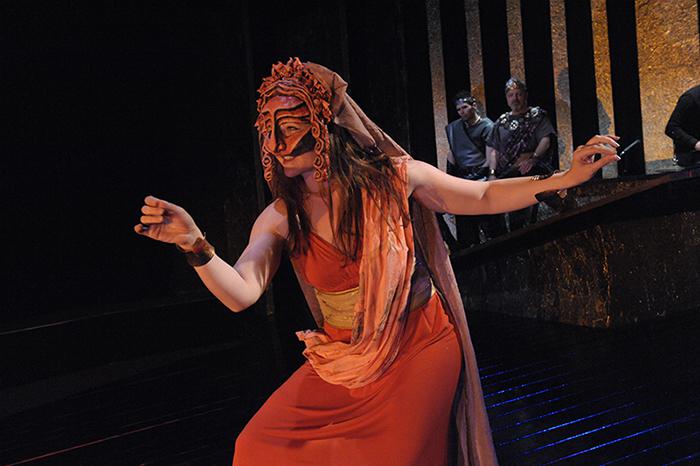The Love of the Nightingale in Washington, D.C.

The Love of the Nightingale, Timberlake Wertenbaker’s thought-provoking play, is not easy to watch but compelling, nonetheless. The plot revolves around the rape and mutilation of a naive and romantic young girl by someone she trusted. Although it is based on Ovid’s account of the myth of Philomela in Metamorphoses, the play goes beyond the simple outlines of that myth. Wertenbaker asks questions about the nature of truth and our relationship to it as she explores what happens to a girl who asserts herself joyfully and fully in the world and, when ordered to submit, refuses.
Wertenbaker asks questions about the nature of truth and our relationship to it
In less skillful hands, Love of the Nightingale could be unremittingly dreary, but Washington, D.C.’s Constellation Theatre, which excels at producing works that explore large, philosophical questions, manages to highlight the play’s most thought-provoking moments and brings to the play’s ending a clear and moving sense of transcendence.
The journey from Athens to Thrace, made by the play’s two young princesses, Procne and Philomele (Wertenbaker’s variation of Philomela), is a move from a belief in order, logic, and truth as a basis for happiness to a knowledge of the depths of human depravity. Constellation’s sparse set, designed by AJ Guban, reflects the two poles—civilized Athens and barbaric Thrace. Wrapped with gold foil, the gleaming walls of the set suggest wealth, aesthetic refinement, and order. The walls contrast with the wooden floor. Stained dark brown on top, each floorboard is painted red along its sides, creating a subtle and unplaceable impression blood. The costumes, too, set up the divide between Athens and Thrace. The king and queen of Athens and their daughters, Procne (beautifully played by Dorea Schmidt) and Philomele (Megan Dominy), are clothed in elegant robes, while Tereus (Matthew Schleigh), Thrace’s warrior king, is garbed in animal skins.
As a reward for helping Athens fight off aggressors, King Pandion of Athens (Edward Christian) tells Tereus he can take anything he wishes back to Thrace with him. He chooses Procne. Although Procne and Tereus have a son, Itys, Procne is lonely in Thrace. She and the women there think differently. “I am Athenian,” she tells one of her female companions. “I know the truth is found by logic and happiness lies in the truth.” Her companion responds, “Truth is full of darkness.” Procne insists, “No, truth is good and beautiful.” Needing someone she can talk to, she sends Tereus to bring her sister, Philomele, to visit.
In Athens, as King Pandion decides whether to let his young daughter make the journey back to Thrace with Tereus, a play is performed, the tragedy of Hippolytus and Phaedra. The king remarks that sometimes plays help him think and he hopes the play can help him figure out an answer to a situation. He hears a line in the play that references danger on the seas and tells Philomele she mustn’t go to Thrace. Philomele insists—she had once promised her sister she would visit. Philomele, a romantic, sees the play as a commentary on the divine nature of love and the pointlessness of resisting it. She shares her views with Tereus, who for his part finds in the plot a justification for consummating his growing desire for Philomele; he considers it to be love, which cannot be denied or avoided. Once at sea, he delays the journey, stopping off at a deserted beach for weeks. He tells Philomele that Procne has died. Philomele, who is infatuated with the ship’s captain and afraid of Tereus, tries to convince the captain to taker her away with him. She places his hand on her breast. Tereus discovers them. He kills the captain, accusing him of trying to rape Philomele. Then Tereus rapes Philomele.
“She should have consented,” remarks Philomele’s servant, Niobe (handily played by Rena Cherry Brown). “Easier that way. Now it will be all pain.”
The rape takes place off stage. Philomele staggers back on stage, her white dress marked in back with a large red splotch. As she washes Philomele, Niobe begs her to be quiet, to please Tereus. Then, perhaps, he will give them some coins. Philomele will not be silent. She asks Tereus what is was that she did which caused him to rape her. A young woman who has spoken with the philosophers of Athens and learned their methods, Pilomele uses logic and concludes that the rape couldn’t have been her fault; she would never have chosen to bring such pain upon herself. She confronts Tereus with the truth about her sister: “She is not dead, I smell her on you.” Finally, Philomele accuses Tereus of being shriveled, empty, and a coward. She threatens to tell all his subjects what he really is like.
In a scene that had the audience gasping, Tereus cuts her tongue out. “You are more beautiful now,” he tells her, “in your silence.” He keeps his “caged bird” hidden away for his pleasure, telling Procne she has died in a shipwreck.
Tom Teasley’s on-stage musical accompaniment on more than seventeen different instruments adds depth to each scene and helps establish suspense. The lighting is also effective. To heighten the suggestion of impending danger, characters’ shadows are cast starkly on the wall behind them.
Five years pass. Then, at the festival of Bacchus, the two sisters meet. Philomele has spent the years carefully making life-sized puppets of herself, her sister, and King Tereus. She thrusts her way into a troupe of performing acrobats and, using the puppets, enacts her own rape and mutilation. The cleverly designed puppets bear a clear resemblance to Dominy, Schmidt, and Schleigh,
And Dominy does a good job of manipulating them to tell her story. The sisters begin to plot their revenge. Procne is holding in her hands a sword given to her son Itys by King Tereus when Itys, wonderfully played by the young Henry Niepoetter, spies the women and rushes in, demanding to know why his mother has his sword. In the most horrific scene in the play, Philomele cuts the child’s throat. Procne holds him, shushing him as if he were a crying baby while he kicks in spasms and at last is still.
A point brought up by the chorus earlier in the play is the importance of questioning. Otherwise, they say, you end up like her (they motion toward Philomele, tongueless and mute). Not to question is a kind of submission. In the final scene of the play, Itys, Philomele, Procne, and Tereus have all been turned into birds. In a bright but soft lighting, they flap resplendent sheets of white cloth, suggestive of wings. Procne, a swallow, is mute. Philomele asks Itys if he understands why it was wrong of Tereus to cut out her tongue. “What does wrong mean?” the boy asks. “It is what isn’t right,” Philomele answers. “What is right?” Itys asks. Philomele answers with a musical trill, which Itys takes up. His voice, his song, ends the play on a pure note of beauty. Throughout the play, lurking beneath the surface, is the poet John Keat’s claim that beauty is truth, truth beauty. Although the truth may be ugly, horrible in fact, and although beauty is not the whole truth, it is, as Itys’ beautiful song suggests, a kind of truth, a kind of answer.








Comments
The article is just the start of the conversation—we want to know what you think about this subject, too! HowlRound is a space for knowledge-sharing, and we welcome spirited, thoughtful, and on-topic dialogue. Find our full comments policy here